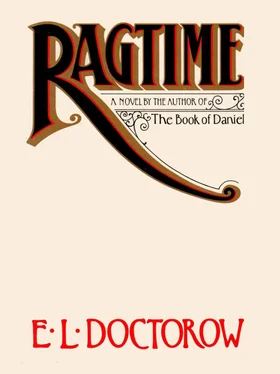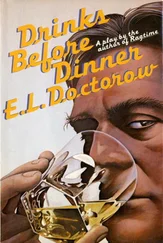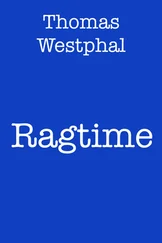Edgar Doctorow - Ragtime
Здесь есть возможность читать онлайн «Edgar Doctorow - Ragtime» весь текст электронной книги совершенно бесплатно (целиком полную версию без сокращений). В некоторых случаях можно слушать аудио, скачать через торрент в формате fb2 и присутствует краткое содержание. Жанр: Современная проза, на английском языке. Описание произведения, (предисловие) а так же отзывы посетителей доступны на портале библиотеки ЛибКат.
- Название:Ragtime
- Автор:
- Жанр:
- Год:неизвестен
- ISBN:нет данных
- Рейтинг книги:4 / 5. Голосов: 1
-
Избранное:Добавить в избранное
- Отзывы:
-
Ваша оценка:
- 80
- 1
- 2
- 3
- 4
- 5
Ragtime: краткое содержание, описание и аннотация
Предлагаем к чтению аннотацию, описание, краткое содержание или предисловие (зависит от того, что написал сам автор книги «Ragtime»). Если вы не нашли необходимую информацию о книге — напишите в комментариях, мы постараемся отыскать её.
Ragtime — читать онлайн бесплатно полную книгу (весь текст) целиком
Ниже представлен текст книги, разбитый по страницам. Система сохранения места последней прочитанной страницы, позволяет с удобством читать онлайн бесплатно книгу «Ragtime», без необходимости каждый раз заново искать на чём Вы остановились. Поставьте закладку, и сможете в любой момент перейти на страницу, на которой закончили чтение.
Интервал:
Закладка:
Father had expected criticism from the police. This was not forthcoming. They regarded him as an expert on the character of the criminal. They encouraged him to spend as much time at headquarters as he could. They wanted him to be on hand for their deliberations. The walls of the rooms were painted light green to a line at waist level, dark green below. There were cuspidors in every corner. Father agreed to make himself as available as he could. This was his busiest time of the year. All the orders for rockets, sparklers, Roman candles, crackers, flares and bombs had to be shipped in time for the Fourth of July celebrations. He went back and forth between his office and the police. To his disgust he found himself at the station in the company of the Emerald Isle Chief, Will Conklin. Conklin smelled of whiskey and the experience of being a hunted man had turned his florid face the color of veal. He was by turn bombastic and craven. He offered counsel of the same level of wisdom that had triggered the crisis in the first place. He wanted to go to the black neighborhood and clean all the niggers out once and for all. The officers heard this with disinterest. They teased him about his fate. We may have to give you to the boogie man, Willie, they said. Just to get some peace around here. Conklin could take little of this. Are we not in this together? he said. God love you, you were cruel lads at St. Catherine’s and yet cruel now. Willie, the Police Chief said, we had to wait to hear from the black man himself that one of you shenanigans is what started this, you dumb Mick, telling us now we’re in this together.
But the Fire Chief’s character and mentality seemed appropriate to the place. There was a constant traffic through the glass doors of felons, lawyers, bondsmen, policemen and hapless relatives. Drunks were brought in by the collar and thieves with their hands cuffed. Voices were loud and language was vile. Conklin owned a coal and ice business and lived with a wife and several children in an apartment over his yard office. It dawned on Father that the man was spending so much time at the police station because he felt safe there. Of course he would not admit it. He boasted of the precautions he had taken at his yard. Not relying on the two posted policemen, he had enlisted all the survivors of the Emerald Isle to billet themselves at his place. They were armed. The nigger might as well attack West Point, he said.
Father felt demeaned by the man. Conklin spoke to him differently from the way he addressed the policemen. His diction improved. His assumption of social equality was galling. It’s a tragic thing, Captain, he would say. A tragic thing indeed. Once he actually put his hand on Father’s shoulder, a gesture of such alarming brotherhood that it felt like an electric shock.
Nevertheless Father found himself spending more and more time here. He found it difficult to go home. On the day of the mass funeral for the victims of the Emerald Isle fire, he went to hear the eulogies. Half the city turned out. A large brass cross swayed over the heads of the crowd. Will Conklin did not leave the police station. I’d be a perfect target for the rifle shot, he said. Questions about his behavior began to circulate through the city. Then the news that the killing of the Night of the Emerald Isle stemmed from a grievance was published in the New York City dailies, where reporters were not constrained by the interests of the local chamber of commerce. The World and the Sun printed the text of Coalhouse’s letter. Will Conklin became a despised person everywhere. He was hated as the stupid perpetrator of events leading to the death of men whom he ostensibly commanded. On the other hand, among certain elements he was scorned as someone who knew how to bait a Negro but not to put the fear of God onto him.
A man wearing a derby now sat in a car every day up the street from the house on Broadview Avenue. Father had not been officially told of this but he advised Mother that he had asked for a police guard, feeling it would be less wise to share with her his speculation that for all their gratitude at his coming forward the police weren’t entirely above keeping an eye on him. He wondered what suspicion they might be entertaining.
Exactly one week after Coalhouse’s attack on the Emerald Isle, at six in the morning, a White town car drove slowly up Railroad Place, a narrow cobblestone street in the West End. In the middle of the block was Municipal Fire Station No.2. As the car drew abreast of the building it stopped and the two policemen standing sleepily before the doors were astounded to see several black men disembark holding shotguns and rifles. One of the policemen had the presence of mind to drop to the ground. The other just stood open-mouthed as the raiders efficiently formed a line, like a firing squad, and upon signal fired their weapons in unison. The blast killed the standing policeman and shattered the windowpanes of the firehouse doors. One of the Negroes then ran up and tossed several small packages through the broken windows.
The man who had given the command to fire came up to the terrified survivor lying on the sidewalk. He placed a letter in his hand and said calmly This must be published in the newspaper. Then he joined the other Negroes, who had returned to the car. As it drove off two or perhaps three explosions, coming one on top of another, blew out the doors of the firehouse and instantly turned it into an inferno. The flames quickly engulfed an adjoining saloon and the establishment of a coffee distributor who also roasted his blends for customers off the street. The sacks of beans produced a yellow pall and left a fragrance of roasted coffee over the neighborhood for several weeks. Eventually four bodies were recovered, all of city firemen. An elderly woman, presumably dead of fright, was found in her rooms across the way. A Reo fire engine and an ambulance were destroyed.
And now the city was truly in panic. Children did not appear for school. Cries of outrage were directed against the city administration and against Willie Conklin. A delegation of firemen marched to City Hall and demanded to be sworn in as police deputies and given arms to defend themselves. The flustered Mayor sent a telegram to the Governor of New York appealing for help. The story of Coalhouse’s second attack made the front pages of every newspaper in the country. Reporters in droves came up from New York. The Chief of Police was condemned for allowing the black killer to do his murderous work again. The Chief made a statement to reporters gathered in his office. The man uses automobiles to get around, he said. He strikes and disappears, God knows where. For several years the Association of Police Chiefs of the State of New York has passed a resolution calling for the licensing of automobiles and automobilists. If that were the law today we could track the brute down. The Chief as he spoke emptied the drawers of his desk. He puffed a cigar. He walked out with the reporters. The next day a bill to license automobiles was introduced in the State Legislature.
Father employed two Negroes at his manufactory, one as a janitor, the other as an assembler of rocket tubes. Neither reported to work the day of the second disaster. In fact Negroes were to be seen nowhere in the city. They stayed home behind locked doors. That night police arrested on the street several white citizens carrying pistols and rifles. The Governor responded to the Mayor’s appeal by sending in two companies of militia from New York City. They arrived the next morning and immediately set up their tents on the baseball field behind the high school. Children gathered to watch. Special editions of the local papers were published and each carried prominently the text of Coalhouse’s second letter. This is what it said: One, that e white excrescence known as Willie Conklin be turned over to my justice. Two, that the Model T Ford with its custom pantasote top be returned in its original condition. Until these demands are satisfied, let the rules of war prevail. Coalhouse Walker Jr. President, Provisional American Government.
Читать дальшеИнтервал:
Закладка:
Похожие книги на «Ragtime»
Представляем Вашему вниманию похожие книги на «Ragtime» списком для выбора. Мы отобрали схожую по названию и смыслу литературу в надежде предоставить читателям больше вариантов отыскать новые, интересные, ещё непрочитанные произведения.
Обсуждение, отзывы о книге «Ragtime» и просто собственные мнения читателей. Оставьте ваши комментарии, напишите, что Вы думаете о произведении, его смысле или главных героях. Укажите что конкретно понравилось, а что нет, и почему Вы так считаете.












